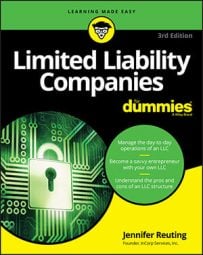Think the federal security laws are a hassle? Well, the ride ain’t over! Not only do you have to comply with federal laws, which are regulated by the SEC, but you also have to register your limited liability company (LLC) and follow state laws — often called blue sky laws — in every state where you’re prospectively looking for money.
Just hope the investor you’re targeting doesn’t live in a backward, complicated state with expensive filing fees!
The term blue sky laws originated from a judge who said that a certain stock being advertised had “about the same value as an area of blue sky.”
Because the laws differ from state to state, registering your securities in multiple states can be very time consuming and very expensive — especially if you have a securities attorney doing all the research and filing.
You can get around the arduous and costly process of registering your offering with every applicable state securities commission, but it still takes some good old-fashioned research on your part. You can use the registration exemption offered by certain states after you find out which states offer it.
Registration exemptions started when the federal government decided to cut small businesses a break and let them raise money without too much red tape. However, even when companies could navigate the federal securities laws, they were still getting hung up by state securities commissions.
So to help out the small businesses and real estate transactions that don’t raise a large amount of financing (between $1 million and $5 million), the Uniform Commission of State Laws, with the blessing of the SEC, tried not only to put all the states on the same page but also to offer registration exemptions that matched those of the federal government.
The result was a set of provisions titled the Uniform Limited Offering Exemption (or ULOE), which basically took the federal registration exemptions 505 and 506, made a few simple variations, and then handed them over to the states, ready for the taking. The federal government offered the ULOE to the states on a silver platter, begging them to copy and paste that set of securities laws into their own state statutes.
The idea was that if a company complied with the federal registration exemptions, then it’d be in compliance with the state securities laws. Some states agreed, but others copied only part of the code. Therefore, you and your attorney must go through each state’s code to see whether that registration exemption is available in your desired state, and if so, what the specific rules are.
If you want to file under the ULOE, get the SEC Form D document. Just remember: Run things by a qualified securities attorney before filing!
Most states offer some variation of the Rule 505 and 506 exemptions. Check the laws yourself or contact a securities attorney who can check for you. Unless you can find an exemption in the individual state’s laws, you’re required to register in that state if you advertise your investment there or take investment from it.

